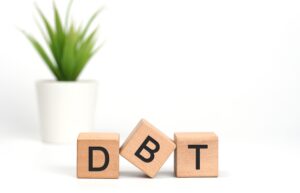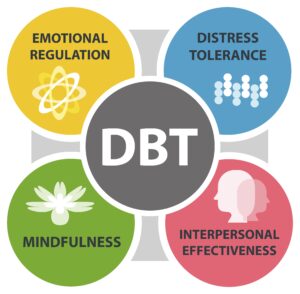
As we go through our fast-paced, everyday lives, it can feel like a challenge to manage and navigate all the intense emotions and unexpected incidents that we’re faced with along the way.
In response to these challenges, Dr. Marsha Linehan created dialectical behavior therapy (DBT) as a road map for individuals struggling with their mental health and emotional wellness. Throughout this blog, we’ll explore how DBT works and how it can benefit you.
What is DBT?
DBT is a specific type of cognitive behavioral therapy (CBT). DBT helps individuals accept and manage the world around them rather than reacting to uncomfortable situations in a harmful way. DBT is a long-term therapeutic practice that’s often used to help work through suicidal ideation or self-harm, complex life difficulties, PTSD, bipolar disorder and other mental health disorders and challenges.
There are four core strategies DBT aims to teach individuals: Mindfulness, distress tolerance, emotional regulation, and interpersonal effectiveness. In particular, DBT can help those who may feel emotions intensely. The “dialectical” portion of DBT means to try and understand how two things that seem opposite could be true at the same time. DBT teaches individuals how to master the art of finding a balance between both change and acceptance of oneself and one’s own environment.
Benefits of DBT
DBT serves several purposes and provides many benefits to individuals seeking help and solace. It’s an incredibly valuable therapeutic approach for individuals struggling with their mental health.
Benefits of DBT Include:
- Strengthens relationships with others. DBT teaches individuals to think before abruptly reacting, and how to build a balanced perspective (middle ground in the case of opposing viewpoints). DBT increases self awareness and decreases destructive behavior which can lead to the nourishment of close supportive relationships.
- Raises self esteem. DBT can use validation techniques that validate one’s emotions and experiences. As this can boost one’s confidence in their emotions, this also translates into personal self esteem as feelings of shame are often lessened. DBT challenges an individual to go against their negative thoughts which in turn negates a lot of negative self talk.
- Enhances emotional regulation. DBT will teach an individual how to manage their emotions rather than be managed by their emotions. These learnt skills will assist in the development of reducing negative emotions and one’s vulnerability to them and help see a more positive outlook on stressful situations.
- Promotes a change in behavior and positive thinking. Because DBT builds an individual’s distress tolerance, it assists in managing anxious or depressive tendencies. It allows individuals to not feel defined by stressful or tumultuous situations and rather work through them with emotional intelligence which makes it easier to have a positive outlook on changes and ones thinking.
What skills can DBT teach me?
DBT is broken up into four different modules: Mindfulness, emotional regulation, distress tolerance, and interpersonal effectiveness.
Mindfulness, when referring to DBT, helps with talking through, being aware and accepting the present moment without judgment. These practices help build awareness skills that teach us to relax our body and mind in times of distress—ultimately, strengthening our mind-body connection. Mindfulness also helps us learn to let go of negative thoughts and intrusive thought patterns.
DBT also focuses on emotional regulation and changing one’s undesired emotions to reduce vulnerability to them. Emotional regulation skills help one examine their distortions and patterns of thinking, and work on emotional urges. These emotional regulation skills are an important part of improving problem solving and coping strategies.
Another skill this type of therapy focuses on is distress tolerance. Improving distress tolerance is important when it comes to our ability to work through crises situations without escalating them. It helps us to understand the distinction between acceptance and approval. Distress tolerance exercises include cost-benefit analysis, grounding techniques and practicing radical acceptance.
Lastly, DBT focuses on building interpersonal effectiveness, which means learning how to apply effective strategies for managing conflict, setting boundaries and communicating our needs to those around us.

DBT at Valera Health
Is it time to try DBT?
Here’s how to know if DBT is right for you:
- You’re experiencing feelings of loneliness and hopelessness that feel insurmountable.
- You seem to lose people quickly or suddenly due to fallouts.
- You struggle to maintain positive relationships with partners, family and friends.
- Your emotions interrupt with work, goals and relationships.
- Your emotions feel debilitating and overwhelming.
Valera Health offers a wide range of virtual DBT therapy groups, both in New York and Arizona. Currently, our DBT skills groups are open to established patients that are 18+ years of age. The majority of Valera’s DBT groups include four modules that run for a total of six months. While participants only need to commit to at least 8 weeks, it is recommended they complete all four.
Valera Health’s DBT program can benefit adults and adolescents experiencing emotional dysregulation, relational issues, poor impulse control and anxiety and depression symptoms.
For those seeking more intimate one-on-one sessions, our providers are well-versed in individual DBT therapy.
Whether you’re interested in a DBT group or individual DBT therapy, you can request a free consultation with Valera Health. We also offer other forms of group and individual therapy, psychiatry and medication management—all from the comfort of your own home.
The best way to know if DBT is for you: You are ready for change and committed to making yourself better.
Though it can be intimidating, reaching out for more information regarding DBT therapy can be one of the most rewarding things you can do for yourself. Whether you have a specific mental health condition or are just looking to improve your life, anyone can benefit from DBT therapy.

Works Referenced:
Dialectical Behavioral Therapy. (2022, November 5). Distress tolerance. DBT. https://dialecticalbehaviortherapy.com/distress-tolerance/
Emotion regulation. DBT Self Help. (2023, September 27). https://dbtselfhelp.com/dbt-skills-list/emotion-regulation/#:~:text=Emotion%20Regulation%20is%20the%20Dialectical,and%20build%20positive%20emotional%20experiences
Schimelpfening, N. (2023, May 1). How dialectical behavior therapy (DBT) works. Verywell Mind. https://www.verywellmind.com/dialectical-behavior-therapy-1067402
Transtrum, T. (2023, May 3). Anxiety & depression are on the rise-here’s what you need to know. Valera Health. https://www.valerahealth.com/anxiety-and-depression-are-on-the-rise/